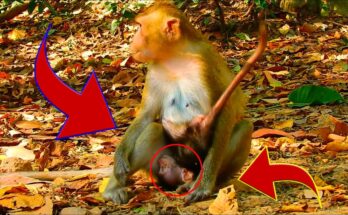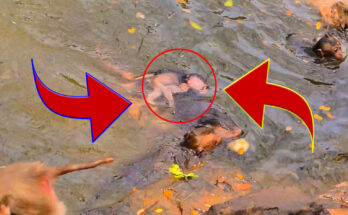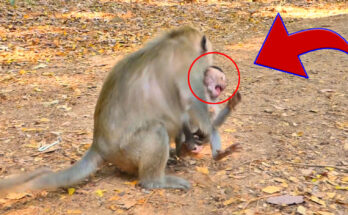Life in the wild is often unforgiving, and sometimes the most heartrending tragedies unfold in the animal kingdom. One such sorrowful event occurred when a baby monkey, full of innocence and potential, tragically passed away. The death of the baby monkey stirs emotions in those who learn of it, as it is not just the loss of a life but the loss of future possibilities, and, in a sense, the death of hope itself.
Monkeys, particularly baby monkeys, are creatures that depend heavily on the nurturing care of their mothers and the support of their communities. In many species, such as macaques and capuchins, infants are born into a tightly-knit social structure where bonds between mothers, fathers, and even extended family members are vital for survival. The infant monkey’s life is shaped by these bonds, and its development is guided by the watchful eyes of its family. So, when a baby monkey dies, especially under tragic circumstances, the loss is more than just the absence of an individual—it is the collapse of a small yet intricate part of the ecosystem that sustains the species.
The tragic fate of this particular baby monkey was undoubtedly the result of a combination of factors—some beyond its control, others perhaps tied to the difficulties of life in the wild. It could have been a simple matter of illness, where the infant’s still-developing immune system could not fend off a viral or bacterial infection. Babies, whether human or animal, are particularly vulnerable to diseases because their bodies are still learning to cope with the many challenges of the outside world. A lack of access to the mother’s protective care or insufficient nutrition could have left the baby susceptible to infections that ultimately took its life.
Another factor that might have played a role in the baby’s death is predation. While monkeys are quick and agile, they are not immune to the predators of the forest or savannah. Whether it was a bird of prey, a large carnivore, or even another member of the monkey’s species competing for resources, the baby could have fallen victim to the brutal realities of nature. In such instances, the death of a baby monkey is particularly painful to witness. Its cries for help, its desperate attempts to cling to life, all serve as a stark reminder of how fragile existence truly is in the wild.
The death of the baby monkey can also be linked to the social dynamics within the group. In some cases, adult monkeys may reject a baby if they sense it is weak or sickly, choosing to focus their energy on caring for healthier offspring. In the competitive world of survival, such harsh decisions are sometimes necessary. However, this callousness is part of the unyielding process of natural selection. While it may seem cruel to us, this is the way the animal kingdom ensures that the strongest genes are passed down to future generations.
What makes this death particularly heart-wrenching is the potential it carried. The baby monkey, had it survived, could have grown up to play an important role within its troop, perhaps becoming a leader or an essential member of the group. It could have learned the skills needed to find food, communicate with others, and raise its own offspring one day. But, in a tragic turn of events, its life was cut short before any of this could come to fruition. The future was taken away in an instant, and the family, though they may not fully comprehend the depth of loss, would undoubtedly feel the absence of the little one.
For those who witnessed the event or who have heard the story, the death of the baby monkey is a reminder of how fleeting life can be. It teaches us to appreciate every moment, to cherish the bonds we share with others, and to understand that loss is a natural, though often painful, part of life. As we reflect on the pitiful death of the baby monkey, we cannot help but feel sorrow for what was lost—the potential, the joy, and the hope that will never come to pass.
In the end, the death of the baby monkey is not just a sad story; it is a poignant reminder of the fragility of life, of how even the smallest among us are subject to the forces of nature. It is a story that resonates with anyone who has experienced loss, reminding us that life, no matter how short, holds great value, and its sudden end can leave us questioning the deeper meaning behind our existence. Oh God, why did the baby monkey die? Why does life sometimes seem so cruel? These are questions that may never have answers, but the pain of such a loss will stay with us, making us more compassionate, more aware, and more grateful for the time we have.


